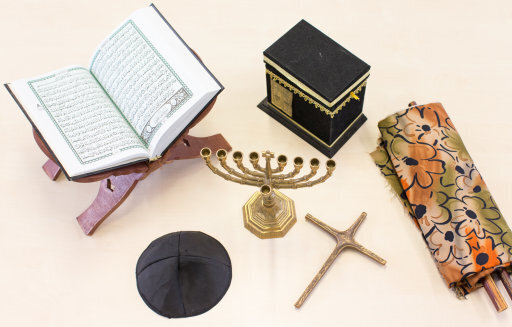What sort of society do we want to live in? This is the question we should always return to when it comes to education policy.
Freedom of speech, respect for the beliefs of others, the spirit of debate – these have long been pillars of British society. Teach these values explicitly in our schools and from the outset starting in the youngest years.
We want to develop twenty-first century thinkers – capable of understanding the history, present practice and nuances of different beliefs. We want skilled intercultural navigators ready to cooperate in a global workforce, also able to build constructive relationships within their communities across religious faiths.
Good confident modern religious education delivers on all these fronts.


At its best, RE introduces our young people to the beliefs and ideas that have been the foundation of human society for thousands of years and continues to do so. Children learn the wonderful stories from different traditions, the fundamentals of ethics, the debates around free will and the nature of God.
RE lesson should become increasingly precious and practical in schools – a space where young people learn to make their own informed and sensible decisions about fundamental aspects of life. RE can be a space for comfortable discussion on beliefs and important insights into students’ families, relationships and society within the framework of our long and proud heritage of informed debate.
When building a society for the future, foundations in religious education is one of our first lines of defence against the ills of ignorance, apathy and extremism.
The Minister for School Standards rightly links the subject to British values and the cohesiveness of our society.
Those comments were given in the context of a question tabled about the lack of funding for the subject.
Last year the government wrongly scrapped the training bursary for RE. Little if any money has been spent on this important subject in the past five years. This must change.
Adjustments to performance measures have also disincentivised schools from providing high quality RE. GCSE Religious Studies has been excluded from the English Baccalaureate while the removal of the RE GCSE short course from the list of subjects that earn performance points for a school has seen its entries fall by 94 per cent. It is wrong to devalue a subject vital holistically in this way.
Schools up and down the country continue to break the law by not offering a suitable RE curriculum. As of last year, only 44 per cent of secondary schools were reported to be reaching the threshold of curriculum time for RE.
With government, Ofsted must do more to ensure our children do not continue to be let down by this embarrassing statistic.
During my time on various All Party Parliamentary Groups, I have had the privilege of speaking to a cross-section of society who have spoken up enthusiastically for the subject.
A minority see it as a statutory inconvenience, a precious slot in the school timetable taken over by ideas they think may have lost influence or importance in society.
These views are wrong. Such remarks misunderstand what the subject can offer, and the landscape of belief in Britain and globally.
They are also at odds with the public, two-thirds of whom see the importance of teaching a modern RE curriculum.
The place of religion and belief in Britain is positively changing and adapting, not declining. Christian values, as well as those taught in the world’s great religions, play an important role in the cultural and historical makeup of our country. It is vital that our children link this learning to the country’s heritage, its future and their place within it.
A National Plan? Let me return to my original question by rephrasing it. What sort of society don’t we want to live in? One where young people are incapable of explaining both their religious and non-religious beliefs, where our discourse is marked by intolerance and ignorance, the antithesis of values in Britain we rightly hail.
In neglecting religious education, we leave a gaping hole in our school curriculum. It leaves young people unprepared for the ethical, moral and religious debates that influence life in modern Britain and the wider world. Put simply we miss an opportunity to provide for our youngsters a shared set of foundation values and an understanding of inter-faiths and communities which can inform and positively enhance our children’s and our society’s future.

